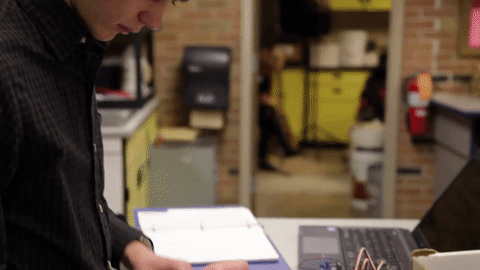
When Chevron started operations in southwestern Pennsylvania a few years ago, the company noticed a familiar disconnect between workforce and available jobs.
“We had our social investment leaders come in from other parts of the country to find out what the issues and needs are here,” said Mary Murrin, the social investment team lead at Chevron Appalachia. “We spent about 18 months to two years listening to people and meeting with people.”
What they discovered, in addition to skills gaps in the training pipeline, was a lack of understanding of what exactly STEM (science, technology, engineering and math) careers entailed.
“The big takeaway was that the perception among parents, educators and business leaders was that STEM careers were only for kids going to four-year colleges,” she said.
The company realized more people needed to make the connections between STEM fields and available opportunities.
“We wanted to look at what kind of retraining might be needed for displaced coal miners, so they could use the skills they already have in a productive way. We’re looking at how we can give residents of these rural communities options to stay here, and figure out where the best family-sustaining wages are,” said Murrin. “We needed to help build that relationship between STEM and the workforce across rural communities.”
To that end, Chevron and Pittsburgh-based Claude Worthington Benedum Foundation have awarded $196,200 in Innovation Grants to 43 southwestern Pennsylvania and northern West Virginia school districts.
In Washington County, a dozen school districts received a total of about $54,000 for a slew of projects, including a LEGO education program at Charleroi Area Middle School, a fab lab at Avella Elementary and a Maker’s Mart at Trinity High School.
The Innovation Grants are part of the Appalachia Partnership Initiative, a program funded by the Benedum Foundation and Chevron to support STEM and technical training programs in 27 counties across southwestern Pennsylvania, Ohio and West Virginia. The partnership also includes the Grable Foundation, the Allegheny Conference on Community Development, Catalyst Connection and the RAND Corp.
These folks have been left behind for 50 years, so we can’t pat ourselves on the back yet for finally making some progress.
Part of the challenge for school districts is that they’re not able to be as nimble as they might like to be when considering changes in the workplace that will affect students in the future, said Jim Denova, vice president of the Benedum Foundation.
“They can’t turn on a dime in response to changes in the marketplace the way companies are sometimes able to,” he said. They may not be able to predict what the high-demand jobs will be, so finding ways to provide training that is more flexible is key, he added.
With the Innovation Grants, Denova said, the schools can advance programs and practices that may be newer but have a longer-term impact for the kids’ future job prospects.
But a big part of the Appalachia Partnership is recognizing that retraining the workforce doesn’t mean starting entirely from scratch, Denova added. “We have to help coal miners figure out what their transferable skills are,” he said. “They may actually be suited for high-demand jobs and not know it.”
Rethinking STEM in an area that relies on heavy industry and manufacturing jobs is a cultural shift, Murrin said, but one that’s perhaps long overdue.
“We don’t assume that every kid needs to go to college, and we shouldn’t look down on these technical professions,” she said. “These folks have been left behind for 50 years, so we can’t pat ourselves on the back yet for finally making some progress.”
Join the conversation!
Find news, events, jobs and people who share your interests on Technical.ly's open community Slack

Delaware daily roundup: Equity Action Summit video; DE Senate debates wind energy; Hydrogen hub listening sessions

Philly daily roundup: Student-made college cost app; Central High is robotics world champ; Internet subsidy expiration looms

Delaware daily roundup: Early-stage loan help; Jobless rate drops below 4%; $700k grant for industrial park

